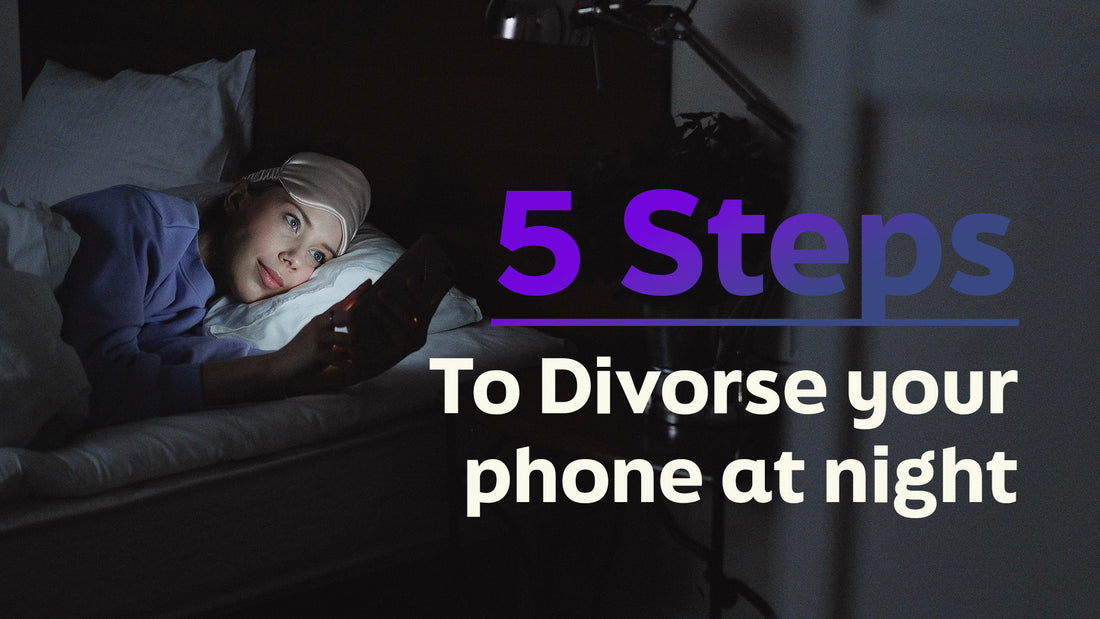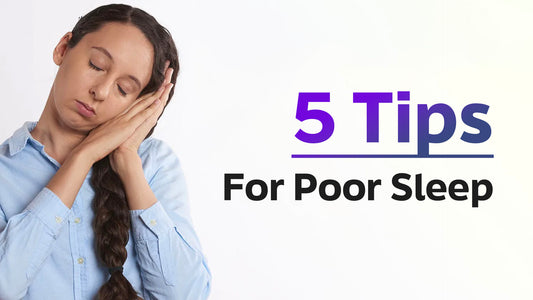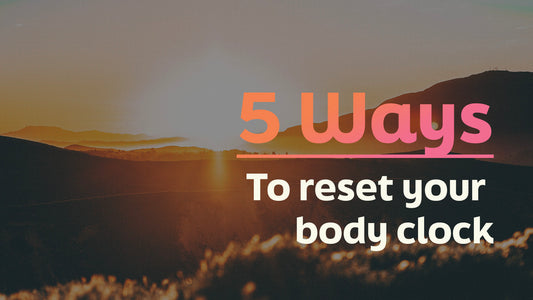I’m a millennial - I get it. I’ve had my mobile phone strapped to me for over 10 years.
Throughout many of those years, I was also glued to it until the moment I fell asleep, and I’m ashamed to say that it actually slept under my pillow with me for at least half a decade.
Truth be told, I’m sometimes still glued to it until far too close to bedtime (*protected by my blue light blocking glasses and light filtering phone apps and settings, of course).
This challenge isn’t reserved only for millennials, however, I’m especially worried about those of us who have grown up with the habitual use of this technology hardwired into our brain and nervous system.
I sleep very well most of the time, and I always use take the necessary steps to protect myself from toxic artificial light at night, but that’s still no excuse to use my mobile phone or other technology devices up until the moment I go to sleep.
Personally, I’m interested in sleep optimisation. Not everybody is as fortunate as me, and I can appreciate that most people aren’t chasing incremental percentage improvements to their health and performance.
Many of us are facing life on the back of a poor night’s sleep day in and day out, which makes the advice that I’m about to share in this guide all that more important.
You see, I know that technology devices present several challenges that stop us from achieving the best quality sleep possible:
- When unfiltered, the blue light that is given off by these devices is the number one factor contributing to your inability to get to sleep, stay asleep and wake up feeling refreshed (learn about that here).
- Our devices constantly stimulate us, increasing the speed of our brainwaves (into a daytime alert state) and encouraging the continuation of daytime brain processes (at least according to science).
- Technology also gives off high amounts of EMF (electromagnetic fields). We’ve known for almost a decade that EMFs disrupt our brain’s ability to produce our natural sleep hormone melatonin (read the research here).
- Finally, most technology devices break our concentration. They distract us, throw us out of flow and remove our ability to stay present. They don’t discriminate. It doesn’t matter whether you’re with your kids, your partner, your colleagues, your favourite book or your evening relaxation practice - the dopamine-driven pull of our technology devices is guaranteed to disrupt your connections to these things in the present moment. I don’t need to present you with evidence here - just look at the face of your loved ones after you’ve cut them off mid-sentence to dive deeper into ‘the gram’ (a millennial abbreviation for the all-pervading Instagram).
BUT DAN… we need technology to communicate and survive.
Damn right we do. My business and my ability to live out my life’s purpose relies on the use of my mobile phone and other devices, but, if I don’t learn how to master their use, especially in the evening, then will continually kick my ass and decimate my sleep.
Whilst it’s true that most of us now rely on these devices to communicate, it’s important that we equip ourselves with BOUNDARIES so that their usage can ADD positively to our lives. I don’t know about you, but I don’t think many of us have gotten this balance quite right yet.
I decided to write this 5 step guide for two reasons.
Firstly, in my recent sleep survey where I asked people “What is your number one challenge when it comes to getting high-quality sleep?” some of the most common answers were…
“technology addiction”, “coming off my phone” and “putting my f*cking phone down at night when I know that I should”
The second reason is that this is one very real challenge that I personally struggle with and can relate to when it comes to getting better sleep.
I’m going to share the 5 direct steps that I take to divorce my mobile phone at night.
They’re the most practical steps I’ve found so far that don’t involve the bog-standard advice from my mother to "just put the phone down” (despite her best intentions, she obviously doesn’t understand how compelling dopamine is at driving our technology addictions).
Stay with me and follow through steps 1 to t. I’ve written them in linear order for a reason, each step moving logically onto the next.
Step 1 - Get clear about why you want to divorce your phone at night
This bit is fairly simple, but the chances are that you might never have taken the time to think about what I’m about to say.
I want you to take a break from reading this article for 30 seconds and write down 5 of the top priorities you care about most in life (ie. your values).
There are no judgements here. Ultimately, what you care about is unique to you.
Whether that relates to your community (such as family or your intimate relationship), health (avoiding heart disease, losing weight or building muscle), the pursuit of high achievement (creativity and productivity at work or performance in sports for example) or otherwise - these are ultimately things that you care about as an individual.
Nobody else can tell you what you care about. I don’t want you to write about things that you think you should care about - if you do, the next part is going to feel less real and it will certainly be less impactful.
Once you can think of at least five priorities in your life (you may think of more), I want you to go to Google or Pubmed (big research database) and enter the following:
"Sleep and *insert your priority*"
Here are some examples; “sleep and weight loss”, “sleep and motherhood”, “sleep and creativity” or “sleep and football”.
What you’ll quickly learn is that everything that you value in life is deeply intertwined and tied to your ability to get a good night’s sleep.
They say “When the WHY is big enough the HOW becomes easy.”
All of these intrinsic (personally decided and internally driven) motivators can act as a compass toward the behaviour changes that we want to make once we become aware of the.
If at this stage you don’t feel even the slightest bit motivated to come off your phone at night after exploring the connection between the things you really care about and your ability to sleep well, maybe the rest of this article isn’t for you…
Step 2 - Turn off any (non-essential) notifications
What I mean by this is disabling any notification that doesn't represent a matter of life and death. I did this about three years ago and have never looked back since.
In fact, I get personally offended by Apple whenever I decide to uninstall/reinstall an app on my phone and I find that the notifications have been automatically reenabled.
In total, it took me about 15 minutes in total to go through all of the apps on my mobile phone and disable their push and noise notifications one by one. I’d hedge my bets that the return on investment for my time has been 1000:1.
The only active notifications that remain are for calls and text messages. My friends and family quickly learnt that if they really needed to contact me, they could still get my attention this way.
I don’t know about you, but the invisible, all-pervading dopamine tug of war between me and my mobile phone is challenging enough without the dings, dongs and other noises from all of the apps suggesting that I REALLY should be up to date with everything that’s happening RIGHT NOW.
Having notifications enabled for your apps (especially social media) is a sure-fire way to keep yourself locked into addictive and needless scrolling until you close your eyes.
After all, there’s always something happening somewhere that someone wants to draw your attention to.
Where you put your attention is where your eenergy flows. The 21st century has become one massive race to capture our attention (and usually the content of our wallets).
My questions to you are: What do you really care about? What’s important to you?
Is it your ability to show up to every day of your life well rested and happy so that you can connect with and enjoy everything that’s meaningful to you?
Or is it the BBC’s latest fear-mongering COVID statistics update, or perhaps fact that Janice uploaded a new photo to her Instagram feed?
Just remove the bloody notifications already and stop making divorcing your phone ta night harder than it already is.
(If you use an iPhone and need some support to do this, check out this article on Business Insider).
Step 3 - Set a goal for the time you’ll cut off using the SMART principles
Do you want to know the number one thing that disrupted me from achieving the goals I set for myself in the past?
Setting totally unspecific (S), unmeasurable (M), unattainable (A), unrealistic (R) and untimely (T) goals.
This was me for most of my adult life...
“The research says that you should come off your phone at least two hours before bed to get the best quality sleep possible, so I’m going to set the goal to cut off from technology at 8 PM because I want to be asleep by 10 PM.”
My main source of motivation? Extrinsic. Because someone else (the research) said so.
This was also me for most of my adult life...
8 PM rolls around and my mobile phone is still glued to my palm. I’ve not even had the chance to reply to my friends’ text messages after a long day, so there’s no way that I’m coming off my phone right now. My brain registers my goal as “failed”. I momentarily feel like crap as a result of being unable to keep my promise to myself and somewhere in my subconscious mind the “fuck it” principle is activated and I just carry on scrolling.
Setting unrealistic goals is the quickest way to ensure failure.
Incrementally increasing the difficulty of your goals as your momentum and motivation build as a result of you fulfilling the promises you make with yourself - a different ballgame altogether. The dopamine reward that your brain receives when you keep the promise that you make to yourself is priceless.
This is me now...
“If I’m aiming to be asleep at 10 PM, I know from experience that I’ll feel much better if I put my phone away for one hour before I go to sleep. I can always banish it earlier if I want to, but 9 PM feels like the most realistic and sustainable goal that I can achieve consistently.”
Take a moment to guess which scenario has faired me better?
My point here is that, yes, I believe it’s important to set a cut off time for your phone. You can even set the night time sky alarm bell that softly dingles to help remind you to put the thing away (reminders can be gold dust to help us in the beginning).
But what I’m really getting at here is the necessity to make your goal simple. It really helps if you can think about whether any goal that you set yourself is SMART (specific, measurable, attainable, realistic and timely).
“I’ll come off my phone sometime before bed” - not specific
“I’ll come off my phone an hour before bed a few days a week” - not measurable
“I’ll come off my phone 3 hours before bed” - not realistically
You get the idea. A much better goal, to begin with, would be...
“I’ll cut off from technology for 60 minutes before bed Sunday - Thursday”.
And if that doesn’t feel realistic with you, break it down further. Begin with 30 minutes and build this time up gradually.
Step 4 - Put your mobile phone to bed
I can almost guarantee that you spend more time with your mobile phone than you do with any other adult human.
In which case, why don’t you treat it with a little bit more respect at night and start putting it to bed? In fact, why don’t you allow your phone the luxury of sleeping in its own bed in another room altogether?
The problem with having our mobile phone in our bedroom is that this creates an association between its usage and our time in bed. If our brains cravings for an evening scroll weren’t already high enough then keeping your phone at arms distance is essentially a form of self-induced torture.
My good friend Mollie McGlocklin, the founder of Sleep Is a Skill, has all of her clients draw a bed on a piece of paper, put the paper in a draw in another room and literally tuck their phone away into the bed at night.
Arianna Huffington has taken this one step further and created a bed charging station for her technology devices so that she can leave them in another room.
I don’t think that you need to necessarily go as far as Arianna, although this sort of thing can be helpful to gamify this behaviour for some people (especially children) if they lack the discipline to put their phone away.
Key take away here - your phone doesn’t belong in your bedroom at night.
If you need an alarm clock, use an old-fashioned one. I recently purchased myself a Casio battery-powered alarm clock from Amazon. It arrived in 4 days and cost me less than £10.
When you remove your mobile phone (and other technology devices for that matter) from your bedroom you are also decreasing your exposure to EMF (electromagnetic fields).
Less EMF exposure = more melatonin production = easier to get to sleep, greater likelihood of staying asleep and better sleep quality over.
Please don’t skip step 4 on the way to step 5.
If you need to use your phone for an alarm clock whilst you’re waiting for your old-school one to arrive then make sure to put it into aeroplane mode at the bottom of your wardrobe or chest of draws.
Step 5 - Do something else after you put your phone down (SOMETHING ENJOYABLE)
This is perhaps best described by me sharing a recent example of how I totally failed at this step.
Last year I was recommended a book called “Nutrition and Physical Degeneration” by Weston A. Price.
It’s a classical (yet often ignored) piece of nutrition literature that dates back around 100 years, telling the story of a famous dentist (Weston) who travelled the world comparing the differences between primitive and modern diets and their effect on health.
I can already tell how thrilled you are.
Well, I decided to buy the book. It’s pretty dense and about 400 pages long. I created a solid (totally un-SMART) goal - I would commit to reading it for an hour every night before bed after I’d put my phone down outside of my room.
I lasted about 3 days until my phone started creeping back into my bedroom. Before you know it I reading less of the book each night and mindless scrolling more and more.
This wasn’t a lack of motivation, discipline or some deep defect of my character.
I just found the book really boring. I already knew the principles that it was trying to teach me (having read many similar books and listened to others talking about this subject), and my idea of a captivating night time read is not pages and pages of information relating to the differences in the formation of two Outer Hebridean brothers' teeth as a result of one eating oats and haggis and the other refined flour.
Why do we often find ourselves doing things that we don’t really want to do (such as scrolling on our phones all night)?
I believe it’s often as simple as understanding that a lot of the time, we’re trying to make ourselves do things that we don’t really want to do (like reading a boring book).
When we do things that we want to do (those things that intrinsically motivate us), there’s no need for motivation.
The solution that I’ve learned is not to do the things that I want to do.
I now prefer to read a fiction book, an autobiography or do some writing before bed. But that’s just me. What's important here is that you do you.
Summary
So there you have it. My 5 step guide to divorcing your phone before bedtime. I would guess that most people need to follow all 5 of these steps for success.
Please remember - we’re all humans in training (or monkeys) that are hurtling through space on a giant disco-ball.
If you weren’t successful today, there’s always tomorrow.
The only thing that matters when it comes to improving the quality of your future sleep is the next decision you make.
If you enjoyed this article, please share it with friends.
Also don’t forget to follow me on Instagram, like my page on Facebook and connect with me through LinkedIn.
If you'd like support to make some changes, you could also consider booking in for a complimentary 30-minute call where we can talk.
Sweet dreams,
Dan



